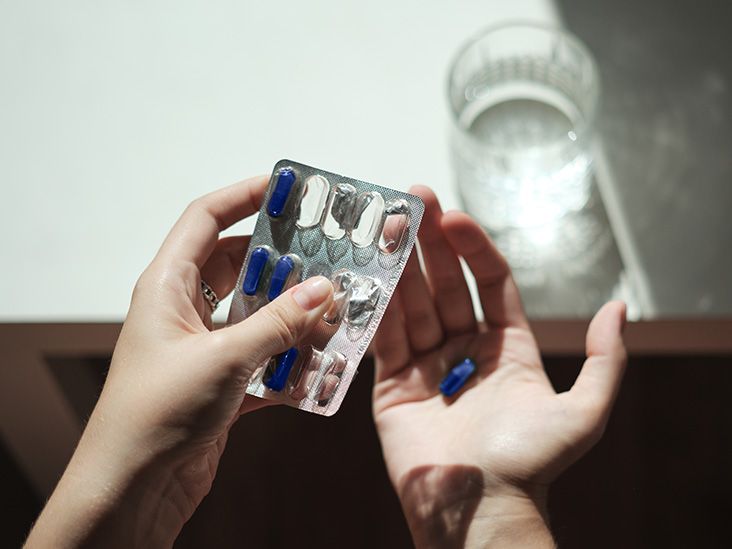Post-traumatic stress disorder (PTSD) can have a range of effects, including changes in sex drive or sexual functioning. In males, this may contribute to erectile dysfunction (ED).
ED refers to difficulty getting or maintaining an erection. It can have both biological and psychological causes or, sometimes, a mixture of the two.
This article discusses the links between PTSD and ED and how a person may recognize and manage their symptoms.

There is some evidence there may be a link between PTSD and ED. A
However, not all the research has found strong associations.
A
It is difficult to know how many people with PTSD develop ED, and this is due to several reasons.
Firstly, some people may feel embarrassed to report either ED or mental health difficulties. Secondly, the research to date has found widely differing statistics.
For example, a review of previous studies from 2021 found figures ranging from as low as 3% to as high as 85%.
The prevalence of ED may also vary greatly due to the effects of other coexisting conditions
PTSD can cause a range of psychological and physical symptoms that may contribute to ED. For example, it may lead to the following effects.
Emotional effects
PTSD can result in many feelings that could interfere with a person’s sexual desire and confidence. For example, it may lead to:
- anxiety
- shame
- anger
- feeling chronically unsafe or “on edge”
- low self-esteem
- distrust of others
Any of these states could affect sexuality. For example, feeling on edge may make it difficult to relax. Stress and low self-esteem are also
Flashbacks and dissociation
PTSD symptoms cause people to re-experience some aspects of the traumatic event, such as emotions or sensations a person felt at the time. Sometimes, an individual may relive the memory.
These experiences are known as flashbacks and occur when a person encounters a trigger, or reminder of a traumatic event. If aspects of a sexual situation are triggering, it could be difficult to get or maintain an erection.
Dissociation could have a similarly disruptive effect. Dissociation causes a person to feel disconnected from their thoughts, body, feelings, or physical reality, while things may feel unreal or distant. This, too, may interfere with having sex.
Physical conditions
There is some research suggesting people with PTSD may be at a higher risk for certain medical conditions during their lifetime. Some of these can affect the physical ability to get erections. Examples include:
- diabetes
- cardiovascular disease
- stroke
PTSD may also lead to changes in behavior that affect physical health, and, therefore, sexual health. For example, it may have links with:
- smoking
- physical inactivity
- issues with diet
These
Medications
In some cases, ED may be a side effect of certain medications doctors can prescribe for reducing PTSD symptoms, such as:
- selective serotonin reuptake inhibitors
- serotonin-norepinephrine reuptake inhibitors
- antipsychotics
- lithium
Even if a person suspects their medication may play a role in their ED, they should not stop taking it or change the dose without speaking with a doctor first. Sudden withdrawal from some PTSD and anxiety medications may be dangerous.
There are
- re-experiencing symptoms
- arousal and reactivity symptoms
- avoidance symptoms
- cognition and mood symptoms
The re-experiencing symptoms include:
- flashbacks
- recurring dreams or memories relating to a traumatic event
- distressing thoughts
- physical symptoms of stress
The arousal and reactivity symptoms include:
- becoming easily startled
- having difficulty focusing
- feeling tense or on edge
- feeling irritable or having outbursts of anger
- struggling to sleep or to stay asleep
- engaging in reckless or destructive behavior
The avoidance symptoms include:
- avoiding certain places, activities, or other reminders of a traumatic event
- avoiding feelings or thoughts relating to a traumatic event
The cognition and mood symptoms include:
- difficulty recalling details from a traumatic event
- negative thoughts about themselves or the world
- persistent negative emotions
- loss of interest in activities
- strong feelings of blame directed at themselves or others
- social isolation
- difficulty feeling positive emotions
This depends on what is causing the ED. Where PTSD is the direct and only cause, then treating this may help with ED. However, there is not yet any research on this.
If multiple factors have a role in a person’s ED, they may also need support in addressing those.
The treatments for PTSD
- trauma-focused cognitive behavioral therapy
- eye movement desensitization and reprocessing
- cognitive processing therapy
- medications to reduce symptoms
People with ED may benefit from speaking with a doctor about the potential effects of some PTSD medications on sexual function before taking them. There may be alternatives they can try.
If a person believes they may have PTSD, speaking with a doctor or therapist can help. This will help them get a diagnosis and recommendations on the best way to begin treating it. These approaches can help reduce symptoms and improve quality of life.
It is also important for anyone experiencing ED to consult a doctor. This is because ED can sometimes occur due to physical conditions that need medical treatment. A doctor will be able to test for these and rule them out.
Help is out there
If you or someone you know is in crisis and considering suicide or self-harm, please seek support:
- Call or text the 988 Lifeline at 988 or chat at 988lifeline.org. Caring counselors are available to listen and provide free and confidential support 24/7.
- Text HOME to the Crisis Text Line at 741741 to connect with a volunteer crisis counselor for free and confidential support 24/7.
- Not in the United States? Find a helpline in your country with Befrienders Worldwide.
- Call 911 or your local emergency services number if you feel safe to do so.
If you’re calling on behalf of someone else, stay with them until help arrives. You may remove weapons or substances that can cause harm if you can do so safely.
If you’re not in the same household, stay on the phone with them until help arrives.
Some evidence suggests there may be a link between erectile dysfunction (ED) and post-traumatic stress disorder (PTSD), although it is not conclusive. Both conditions are complex, and there are many ways one could influence the other.
PTSD may cause symptoms that make sex difficult or even distressing, in some cases. It may also have links to physical health concerns that affect sexual health. Another possible relationship is in PTSD medications, some of which can cause ED as a side effect.
Anyone with worries about ED or PTSD needs to speak with a health professional for advice.


